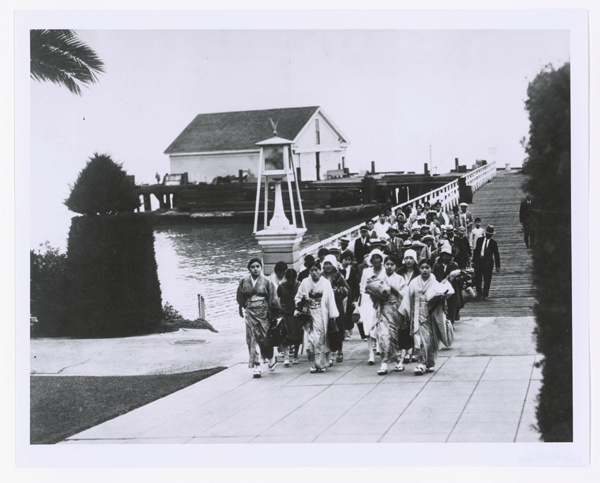“Since 1988, the National Trust for Historic Preservation has been naming America’s most endangered historic places, attracting much-needed awareness and funding.”
Read More“Our second workshop in San Francisco focused on a subnational perspective of the U.S.-China relationship,” Plantan said. “One of the highlights of that trip, for me, was a guided tour of the Angel Island Immigration Station, where we learned about the history of the Chinese Exclusion Act of 1882 and Chinese immigration to the United States.”
Read MoreThis former quarantine and military station once processed as many as one million immigrants. Now, the picturesque island is one of the San Francisco Bay Area's best urban getaways.
Read MoreI wanted to imagine myself as my grandmother, experiencing the chaos and fear of her escape to China, and then her solo voyage to California with only $2.50 in her pocket.
Read MoreFor three decades, Del Sol Quartet has been committed to the music of our time. But with their Angel Island project, the group is looking back on local history and tracing its resonance to the present day.
Read MoreDozens of Illinois teachers watched the ranger in a recorded video. They had gathered over Zoom to learn about how they could incorporate Angel Island and other key elements of Asian American history into their lessons. It was part of a university-led training meant to help Illinois teachers comply with a three-year-old, first-in-the-nation law that requires schools statewide to teach at least one unit of Asian American history.
Read MoreStacker used information from the National Park Service and other sources to compile a list of historical sites, like 'Iolani Palace and Angel Island, where you can learn more about Asian American, Native Hawaiian, and Pacific Islander heritage. This is by no means a comprehensive list; instead, you can use it as a starting point to find even more heritage sites like Kaunolu Village and Morro Bay.
Read MoreToday, we learn about a play that portrays the historical hardship and heart of Bay Area Chinese immigrants. Then, we’ll learn the secret that unlocked a new life for the historic immigration station at Angel Island. And, we visit China Camp state park where the past and the present live side by side.
Read MoreWhen Han Sang Gee lands at Angel Island in 1909 in Lloyd Suh’s haunting “The Far Country,” he knows he will have to sacrifice much of who he is as an immigrant. But he’s unprepared for just how identity must be lost, how much bravery must be mustered to forge a new life in a foreign land, then and now.
Read MoreKaur shared that the ancestor she was envisioning was her grandfather from 110 years ago when he immigrated from India to Angel Island in California in hopes of a better life as a farmer. Kaur explained that Angel Island’s purpose was to incarcerate, detain and deport as many Asian immigrants as possible. She said that South Asians were the least desirable race to the immigration officials at Angel Island.
Read MoreSuh’s new play “The Far Country,” now getting its West Coast premiere in Berkeley, explores some of the far-reaching impact of the Chinese Exclusion Act on immigrant families. Set in 1909 in the wake of the San Francisco Earthquake, the play deals with the phenomenon of what’s sometimes called “paper sons,” immigrants with forged documents establishing them as children of U.S. citizens.
Read More“Don’t touch the walls,” Angel Island Immigration Station Foundation Executive Director Ed Tepporn said. “They’re historic. There’s also lead paint in them.”
He was addressing the cast and creative team of Berkeley Repertory Theatre’s “The Far Country,” which is set partly on Angel Island in the era of the Chinese Exclusion Act. On a brisk winter day, with dramatic clouds threatening rain, the theater artists were making an unusual field trip, riding a ferry to the island where a half-million emigrants, the majority from Asia, were processed from 1910 to 1940.
Read MoreMost people know about Ellis Island, America’s major port of entry under the Statue of Liberty. Less famous, but just as important and on the West Coast, was the immigration station at Angel Island.
Read MoreWhile New York’s Ellis Island is forever etched in American history for being the busiest immigration processing station in the country, Angel Island served a similar role on the West Coast. In fact, between 1910 and 1940, more than 500,000 immigrants passed through the tiny island just off the coast of the city in the middle of the San Francisco Bay. The free-to-visit Angel Island Immigration Station is a living landmark of that experience. What’s more, you can get to Angel Island by riding the Golden Gate Ferry from the Embarcadero, which passes by Alcatraz and looks out at both the Golden Gate Bridge and Bay Bridge.
Read MoreOakland Ballet Company's 2023-24 Season will continue in March with the third annual DANCING MOONS FESTIVAL, a celebration of Asian American and Pacific Islander choreographers. The highlight this year will be the preview of a major new work inspired by the lives of detainees at Angel Island, the United States' main immigration facility on the West Coast from 1910 to 1940.
Read MoreYou can count on suffering to supply stage music with heft, and Huang Ruo’s choral drama Angel Island mined a mother lode of the stuff in its inaugural run at BAM this past week. Equal parts requiem, oratorio, and manifesto, Angel Island tells the collective story of Chinese immigrants held at a notorious detention center in San Francisco Bay.
Read MoreIn “Angel Island,” a staged oratorio about the anguish and isolation of Chinese detainees at Angel Island Immigration Station in California, a choir recites a poem about tyranny and misfortune.
Read MoreIn 1971, firefighters deliberately torched 12 small cottages at the Angel Island Immigration Station as part of a training exercise. No one seemed to care that the cottages had been designed by renowned California architect Julia Morgan. The cottages burned to the ground with only their cement foundations remaining.
Now Angel Island Immigration Station Foundation officials have secured a $1-million state grant to rebuild two of the free-standing cottages using Morgan’s surviving drawings.
Read MoreA pair of Angel Island cottages designed by one of California's most famous architects will be rebuilt thanks to a fresh infusion of state money for the project.
Read More



















